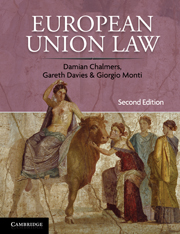Book contents
- Frontmatter
- Contents
- Map
- Preface
- Abbreviations
- Table of Cases
- Table of Treaties, Instruments and Legislation
- Table of Equivalents
- Electronic Working Paper Series
- 1 European Integration and the Treaty on European Union
- 2 The EU Institutions
- 3 Union Law-making
- 4 The EU Judicial Order
- 5 The Authority of EU Law
- 6 Fundamental Rights
- 7 Rights and Remedies in National Courts
- 8 Infringement Proceedings
- 9 Governance
- 10 Judicial Review
- 11 EU citizenship
- 12 EU Law and Non-EU Nationals
- 13 Equal Opportunities Law and Policy
- 14 EU Criminal Law
- 15 External Relations
- 16 The Internal Market
- 17 Economic and Monetary Union
- 18 The Free Movement of Goods
- 19 The Free Movement of Services
- 20 The Pursuit of an Occupation in Another Member State
- 21 Trade Restrictions and Public Goods
- 22 EU Competition Law: Function and Enforcement
- 23 Antitrust and Monopolies
- 24 State Regulation and EU Competition Law
- Index
18 - The Free Movement of Goods
- Frontmatter
- Contents
- Map
- Preface
- Abbreviations
- Table of Cases
- Table of Treaties, Instruments and Legislation
- Table of Equivalents
- Electronic Working Paper Series
- 1 European Integration and the Treaty on European Union
- 2 The EU Institutions
- 3 Union Law-making
- 4 The EU Judicial Order
- 5 The Authority of EU Law
- 6 Fundamental Rights
- 7 Rights and Remedies in National Courts
- 8 Infringement Proceedings
- 9 Governance
- 10 Judicial Review
- 11 EU citizenship
- 12 EU Law and Non-EU Nationals
- 13 Equal Opportunities Law and Policy
- 14 EU Criminal Law
- 15 External Relations
- 16 The Internal Market
- 17 Economic and Monetary Union
- 18 The Free Movement of Goods
- 19 The Free Movement of Services
- 20 The Pursuit of an Occupation in Another Member State
- 21 Trade Restrictions and Public Goods
- 22 EU Competition Law: Function and Enforcement
- 23 Antitrust and Monopolies
- 24 State Regulation and EU Competition Law
- Index
Summary
INTRODUCTION
Article 34 TFEU prohibits restrictions on the import of goods from other Member States. Case law has divided measures which may be restrictions into three categories, governed by three important cases, Dassonville, Cassis de Dijon and Keck. The structure of the chapter reflects this.
Section 2 discusses the umbrella notion of a restriction on imports, which is provided in Dassonville. This case established a very broad scope to Article 34, applying to any measure which impedes imports, however that effect is achieved. A recent case, Alfa Vita, even suggests that if a measure results in reduced sales of certain goods this may be enough to bring it within Article 34.
Section 3 discusses the application of Article 34 to product rules. The basis for this application is provided in Cassis de Dijon. Product rules are rules which require producers to change some aspect of the physical product or its packaging before it may be sold. Examples are rules which only allow the sale of foodstuffs made in certain ways, or which limit the kinds of containers that can be used for soft drinks. The Court of Justice held in Cassis de Dijon that even if these rules apply equally to imports and domestic products, they are nevertheless restrictions on imports.
- Type
- Chapter
- Information
- European Union LawCases and Materials, pp. 744 - 782Publisher: Cambridge University PressPrint publication year: 2010

